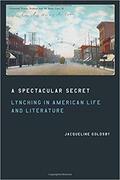
This incisive study takes on one of the grimmest secrets in America’s national life—the history of lynching and, more generally, the public punishment of African Americans. Jacqueline Goldsby shows that lynching cannot be explained away as a phenomenon peculiar to the South or as the perverse culmination of racist politics. Rather, lynching—a highly visible form of social violence that has historically been shrouded in secrecy—was in fact a fundamental part of the national consciousness whose cultural logic played a pivotal role in the making of American modernity.
To pursue this argument, Goldsby traces lynching’s history by taking up select mob murders and studying them together with key literary works. She focuses on three prominent authors—Ida B. Wells-Barnett, Stephen Crane, and James Weldon Johnson—and shows how their own encounters with lynching influenced their analyses of it. She also examines a recently assembled archive of evidence—lynching photographs—to show how photography structured the nation’s perception of lynching violence before World War I. Finally, Goldsby considers the way lynching persisted into the twentieth century, discussing the lynching of Emmett Till in 1955 and the ballad-elegies of Gwendolyn Brooks to which his murder gave rise.
An empathic and perceptive work, A Spectacular Secret will make an important contribution to the study of American history and literature.